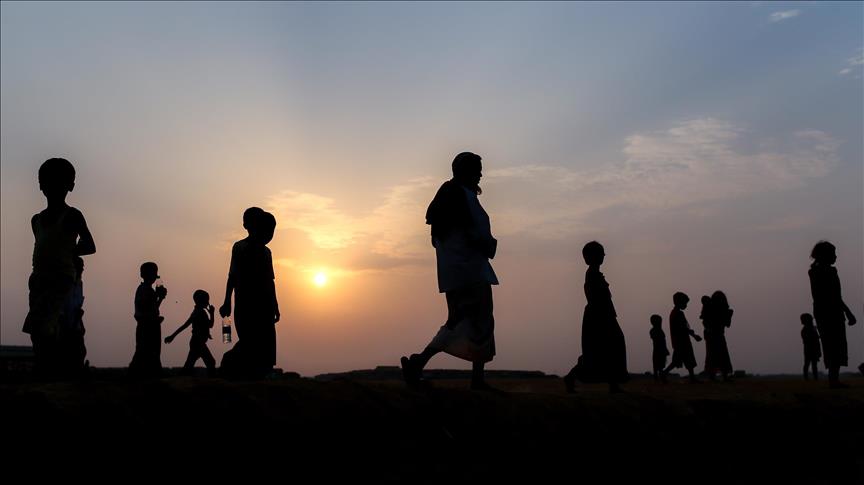Rohingya Activists Share Stories of Community’s Plight
ASIA-UPDATES ON MYANMAR ROHINGYA GENOCIDE, 11 Feb 2019
Umar Farooq | Anadolu Agency – TRANSCEND Media Service
New York conference highlights Muslim minority’s predicament and calls on world to pressure Myanmar to stop attacks.
9 Feb 2019 – Fear, intimidation, repression and genocide. These are the words used by members of the Rohingya community to describe what is happening to them at the hands of Myanmar’s military forces.
“Some may think that by leaving a repressive, genocidal regime, Rohingya will be free,” said Yasmin Ullah, a Rohingya activist.
“Fear and intimidation are part of everyday life in Arakan, or what is called Rakhine state today. Fear and intimidation follow us everywhere.”
On Friday, the Free Rohingya Coalition (FRC) brought together scholars and activists for a two-day conference in New York, where they aimed to showcase the plight of the Muslim minority and call on the world to listen and put pressure on Myanmar to stop the attacks against the Rohingya.
Razia Sultana, the FRC’s Coordinator for Women and Children’s Affairs, said she was “deeply disappointed” that the international community has yet to take any strong or purposeful action against the people responsible for the genocide.
In a fact-finding mission in October, the UN noted that the genocide against the Rohingya is still going on, but Sultana pointed out that there was still no action from the Security Council.
But other Rohingya such as Thun Khin, president of the Burmese Rohingya Organization, saw the UN declaration of genocide as an opportunity to call for international support on behalf of what the UN describes as the world’s most persecuted people.
“Finally the world has caught up to what we have been saying for many years. Our community, we’ve been saying, the only word to describe what is going on is genocide,” Khin said.
More than 750,000 Rohingya refugees, mostly women and children, fled Myanmar and crossed into Bangladesh after Myanmar forces launched a crackdown on the minority Muslim community in August 2017, according to Amnesty International.
Since then, nearly 24,000 Rohingya Muslims have been killed by Myanmar’s state forces, according to a report by the Ontario International Development Agency (OIDA).
The OIDA also reported that more than 34,000 Rohingya were also thrown into fires, 18,000 Rohingya women and girls were raped by Myanmar’s army and police, and over 115,000 Rohingya homes were burned down.
The UN has also documented mass gang rapes, killings – including of infants and young children – brutal beatings and disappearances committed by Myanmar state forces.
Long History in Myanmar
Khin, whose grandfather served as a secretary of the Burmese parliament, outlined the history of the Rohingya community in Myanmar.
“We’ve been living here for many centuries,” he said.
Khin noted that the campaign against the Rohingya is not a new issue and has been going on for decades, and the Myanmar government’s end goal is genocide.
When the military began operations against the Rohingya, the Rohingya thought they could turn to opposition leader Aung San Suu Kyi, who was then under house arrest, for support. Khin mentioned that he had even campaigned for her release across the Western world.
Suu Kyi had promised the Rohingya their basic rights once democracy was established. But once she came into power, she too became complicit in the state’s crimes.
“If she wanted to, she could open up Rahkine state to aid access. Or she could release the writers, journalists who have highlighted military atrocities against the Rohingya. But she has chosen not to do anything,” Khin said.
Khin’s experience with the civilian government left him much more wary of relationships with the Myanmar government and cemented his understanding that it is the Rohingya community that needs to be given the authority to make their own decisions.
“If history has taught us anything, it is that Rohingya cannot be left at the mercy of Myanmar forces. Rohingya must also have a seat at the table to determine our own future,” Khin added.
___________________________________________________
Dildar Baykan contributed to this report from New York
DISCLAIMER: The statements, views and opinions expressed in pieces republished here are solely those of the authors and do not necessarily represent those of TMS. In accordance with title 17 U.S.C. section 107, this material is distributed without profit to those who have expressed a prior interest in receiving the included information for research and educational purposes. TMS has no affiliation whatsoever with the originator of this article nor is TMS endorsed or sponsored by the originator. “GO TO ORIGINAL” links are provided as a convenience to our readers and allow for verification of authenticity. However, as originating pages are often updated by their originating host sites, the versions posted may not match the versions our readers view when clicking the “GO TO ORIGINAL” links. This site contains copyrighted material the use of which has not always been specifically authorized by the copyright owner. We are making such material available in our efforts to advance understanding of environmental, political, human rights, economic, democracy, scientific, and social justice issues, etc. We believe this constitutes a ‘fair use’ of any such copyrighted material as provided for in section 107 of the US Copyright Law. In accordance with Title 17 U.S.C. Section 107, the material on this site is distributed without profit to those who have expressed a prior interest in receiving the included information for research and educational purposes. For more information go to: http://www.law.cornell.edu/uscode/17/107.shtml. If you wish to use copyrighted material from this site for purposes of your own that go beyond ‘fair use’, you must obtain permission from the copyright owner.
Read more
Click here to go to the current weekly digest or pick another article:
ASIA-UPDATES ON MYANMAR ROHINGYA GENOCIDE:
